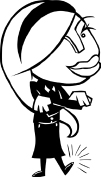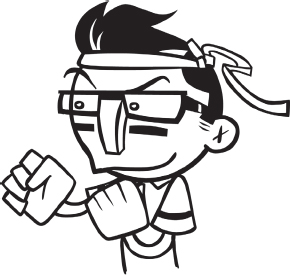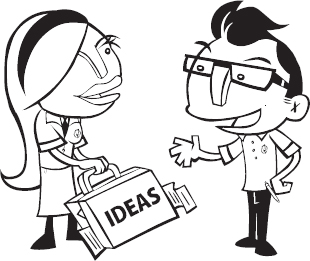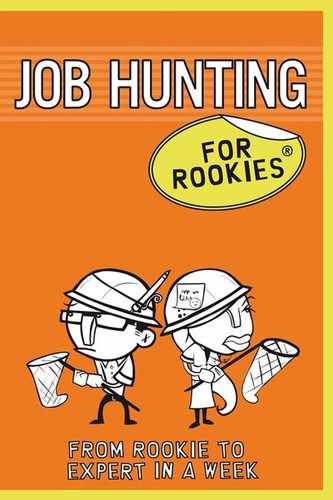CHAPTER 6
Communicating with
confidence
Understanding the importance of personal impact
When interviewers decide who to hire, the candidate with the best skills and experience does not always get the job! Many interviewers are heavily influenced in their decision-making by factors such as how candidates look and dress and speak, and whether they come across as likeable people. Interviewers are as interested in personal chemistry as they are in job competence. Many interviewers would rather hire someone they like, but who doesn’t have quite the right skills, than someone who has the right skills, but comes across as boring or arrogant!
If you want to get the job, you must manage your personal impact – how you come across. You must present yourself as the person who you think the employer is looking for. Think of an interview as a first date. If you go on a date with someone you’re attracted to, I’ll bet that you probably make a bit more of an effort than usual.
So in your next interview, if you know that you can be a little shy, then try to be more gregarious. If you know that you are a bit loud, then try to quieten down. Behave in the way that the employer would like to see, and you’re more likely to get offered the job. You could always turn the job down – but at least then you have the luxury of choosing whether to turn the job down or not, rather than having the employer reject you for “being yourself ”.
 Rookie Buster
Rookie Buster
Behave in the way that the employer would like to see, and you’re more likely to get offered the job.
Dressing to impress

We all make snap judgements about each other. See a man wearing black leather trousers, black eye make-up and multiple piercings in his face, and you may get a certain instant impression of him. See a woman with greasy hair wearing stained trousers and a dirty t-shirt and you may make another judgement.
You can help to ensure that the interviewers think you are suitable for the job by paying attention to how you dress and look. But wearing a suit may not always be your best option. For example, if you’re going for a job working in a “creative” industry such as advertising or fashion, the people there may see people who wear suits as stuffy and dull! Instead follow these steps to decide how best to dress:
1. Telephone the switchboard of the organization and ask about the dress code. Explain that you have an interview and want to check what to wear so that you do not commit a sartorial mistake. If you can, avoid being fobbed off by a receptionist. Try to speak to the secretary or assistant of the manager who will be interviewing you.
2. Visit the office of your chosen employer and stand outside the building for a few minutes. Observe the people walking through reception and take note of what they are wearing. If most people are in smart suits or casual clothes or highly fashionable clothes, you should try to dress accordingly.
If in doubt, wear a suit. You’re better off dressing a little too smartly than being underdressed. For example, a man who is wearing a suit and tie can simply take off his tie and unbutton his top button to appear less formal; women should look for a skirt and top combination that would be appropriate in either fairly formal or more relaxed circumstances.
 Rookie Buster
Rookie Buster
You’re better off dressing a little too smartly than being underdressed.
Conveying confidence through body language
Employers want to hire people who are at least reasonably confident. So have a think about what that means for the different aspects of your body language.
Maintaining eye contact
Think about people you may know who constantly avoid eye contact. They may come across as shy or guilty – or both! So you will win points with an interviewer for making strong eye contact.
As a rule of thumb, try to look at the interviewers in the eyes (for at least 90 per cent of the time) when they are speaking or asking you questions. And when you are answering an interview question, aim to maintain eye contact for at least 60 to 70 per cent of the time. However, feel free to look away occasionally – for example, many people look away into the middle distance when thinking about the right way to answer an interview question.
Demonstrating “active listening”
Just paying attention to the interviewer isn’t good enough; the interviewer must actively see that you are paying attention. Good candidates use a technique called “active listening” to demonstrate visibly to an interviewer that they are listening to the interviewer’s every word.
In order to use this technique, aim to:
• Nod occasionally when the interviewer speaks, to show that you understand what is being said.
• “Flash” your eyes occasionally by raising your eyebrows. Again, this shows that you are paying attention to the interviewer’s words.
• Use vocal cues such as “uh-huh”, “yes” and “mm-hmm” intermittently to give the interviewer confirmation that you are following the gist of the conversation.
 Rookie Buster
Rookie Buster
Just paying attention to the interviewer isn’t good enough; the interviewer must actively see that you are paying attention.
If you’re not sure how “active listening” works in practice, then watch your friends or colleagues when you next meet them. You’ll see how they use their head movements, facial expressions and verbal utterances to show they’re listening to you.
Using your hands and body
Your posture and use of physical movement send out clear signals about how you may feel during the interview. To ensure that you project an aura of confidence (even if you may not feel it!) be sure to:
• Keep your posture upright at all times. Imagine that there’s a piece of string attached to the top of your head and that someone is pulling it towards the ceiling. Avoid letting your shoulders hunch forwards if you’re perhaps nervous or tired.
• Avoid fidgeting. People who play with or even keep touching their jewellery, hair or keys come across as restless and lacking in confidence. Keep your hands still and visible – perhaps on the armrests of your chair, clasped lightly in your lap or in front of you on the table if there is one.
• Use your hands to emphasize key points. Research shows that candidates who use hand gestures come across as more sincere and credible. So use your hands occasionally to make yourself more visually engaging – for example by counting points off on your fingers or moving your hands to illustrate the stories you tell.
• Avoid crossing your arms or legs. Some interviewers believe that crossing your arms or even your legs is a sign of defensiveness. So don’t do either.
• Keep any movement slow and fluid. Whether you are shifting posture, moving your feet to get more comfortable, or making gestures with your hands, avoid making rapid, jagged movements, as these can convey nervousness. Make any movements slow and almost unnoticeable so that the interviewer can pay attention to what you say rather than your physical movements or twitches!
Speaking with confidence
Interviewers frequently complain about being forced to listen to monotonous candidates droning on and on about their experiences. So be sure to enliven your interview responses through tone of voice and inflection:
• Consider the loudness of your voice. Have you ever been told that you speak a bit too quietly or loudly? Being barely audible will make you sound like a shy, weak candidate; being too loud could make you seem bossy and arrogant.
• Vary the tone and pace of your voice. If you’re speaking about an achievement or something that you should be excited about, be sure to speak in an enthusiastic (in other words, slightly higher pitched and moderately quicker) tone of voice. If you’re being asked to talk about difficult circumstances, problems or serious issues, you should speak in a more sombre tone (that is, by deepening your voice and speaking more slowly).
• Articulate your words with care. Nervous candidates often mumble their words. So make sure that you pronounce your words carefully.
If you’re at all prone to nervousness, run through a mock interview with a friend and ask for candid feedback on how you sound. Even better if you can record your voice or even videotape your entire performance to see and hear how you look and sound.
Projecting a positive and upbeat demeanour
The job market can be quite a rollercoaster. People sometimes get fired or get into nasty disagreements with their previous employers. Plus more and more people are finding themselves being made redundant – often through no fault of their own. If that has happened to you, I can understand that you may be feeling glum or sad, slightly resentful or downright angry.

However, interviewers only want to hire positive, upbeat people! So if you feel any negative emotions, you need to hold them in check to maximize your chances of getting offered a job.
If you feel that you have suffered some terrible injustice, try the following expressive writing exercise to help you to let go of the past and prepare for a brighter future. You will need 30 minutes away from distractions. Take a sheet of paper and:
1. Spend 10 to 15 minutes simply writing (or typing) about how you feel. You must write about not only about the unfortunate experience(s) but also the emotions that you feel as a result of them.
2. Then spend another 10 to 15 minutes writing about your hopes and goals in your life and work. What are you realistically hoping to achieve, both in your career and outside your work?
In your writing, make sure you explore your deepest emotions and thoughts. No one else will ever see what you write – this exercise is solely for your benefit. Don’t worry about spelling or grammar. Just be totally honest about what you are thinking and feeling, your worries and fears, hopes and dreams. The only rule is that you keep writing for the full 30 minutes.
Once you have finished, take what you’ve written and seal it away in an envelope, symbolically distancing yourself from the past and the emotions that go along with it.
Now, you may wonder about the point of this exercise. But trust me: I’m a trained psychologist. In fact, a research study showed that this technique helped a group of job hunters to find new jobs more quickly than job hunters who did not use the technique. For whatever reason, this technique works. Use it!
Handling pre-interview nerves
Many people are their own worst enemies when it comes to interviews. If you ever feel nervous before interviews, you may find thoughts running through your head such as “I’ll never get the job” or “I’m terrible at interviews”. And then, during the interview, you probably over-think everything you say, with the little voice inside your head making comments such as “No – that was such a stupid answer!” or “The interviewer looks bored – I must be a bad candidate!”
Psychologists call such thoughts automatic negative thoughts, or ANTs for short. These ANTs seem to pop unbidden into your consciousness and can be very damaging to your confidence. But the good news is that you can make a conscious effort to combat them.
Using your personal confidence coach
You can put a stop to the inner voice coming out with negative comments such as “this won’t turn out well” or “I hate interviews”. Psychologists have found that you can drown out the ANTs by preparing a set of positive statements about yourself. I call these positive statements capability-affirming thoughts, or CATs.
Many people hire personal trainers to help them exercise. A personal trainer might say something like “Come on – just two more minutes on the treadmill!” or “Only three more press-ups to go – you’ve done so well, you’re fantastic!” Now imagine a personal coach whom you have hired to help to boost your confidence – what would your coach say to you? Here are examples of the kind of positive comments that a confidence coach might shout at you to urge you on:
• “Stay confident – you can do it!”
• “You can stay positive if you want to.”
• “Keep smiling.”
• “You’ve got great skills and the right experience – you’ll get this job!”
• “Come on, you’ve survived interviews before and you can do it again!”
Now take a few minutes to write down a handful of positive statements that you think would help to spur you on. Jot these CATs on a sheet of paper or a small piece of card to keep at hand.
Whenever you need a lift – whether that’s when you’re feeling despondent sat at home writing CVs and covering letters or in the moments just before you go into an interview – repeat these CATs under your breath to yourself. Imagine that someone – your personal coach – is shouting these to you from just over your shoulder. Keep doing it and you can banish those worrisome thoughts from your head.
This works. Do it.
 Rookie Buster
Rookie Buster
Imagine a personal coach whom you have hired to help to boost your confidence – what would your coach say to you?
Counting down to your interview
Job hunters sometimes let themselves down because they don’t get their preparations right just before the interview. A little advance planning will help you to stride into your interview full of confidence. Make sure you work through these positive steps:
1. Familiarize yourself with the time, date and location for your interview. Make sure you check where and when you are supposed to turn up for your interview. I have personally had more than one candidate who has turned up a week too early because they misread the date on their letters!
2. Plan your journey to the interview. If you are not sure about how to get to your interview, be certain to plan your route and journey time so that you can turn up with time to spare.
3. Get your outfit ready the night before. Nothing worse than getting ready to set off for your interview only to find that your favourite item of clothing is creased or has a stain on it.
4. Print out copies of your CV to take along. Interviewers sometimes misplace CVs just prior to an interview. So be ready to hand pristine copies of your CV to the interviewer(s) if they don’t have it to hand.
5. Take a quality newspaper with you that morning. If you arrive at the location of the interview more than 30 minutes early, go find a café and read the newspaper, as some interviewers interpret being too early as over-anxiousness.
 Rookie Buster
Rookie Buster
A little advance planning will help you to stride into your interview full of confidence.
Making your first impression count
Be aware that most interviewers (and in fact most people) are unduly swayed by first impressions. You can create a really positive and lasting impact by making a concerted effort during those first few minutes. So be sure to make a great first impression by following these pointers:
1. Pre-plan fragments of small talk. Arrive at reception at least 10 or 15 minutes early and look around you for features that you could genuinely praise. So when the interviewer arrives, you can make some complimentary comment such as “I really love the artwork you have on the walls here,” “Your receptionist is really friendly!” or “You’re lucky to have such a lot of light coming through into your reception.” So long as your comment is genuine, you will come across immediately as positive and interesting.
2. Watch out for smells and stickiness! Pop a sugar-free breath mint into your mouth while you wait in reception. And just as you see the interviewer approach you, discreetly wipe your right hand either on a handkerchief in your pocket or even on the back of your trouser leg or skirt. You want a dry palm – not a sweaty one – before shaking hands.

3. Smile warmly and offer a strong handshake as you introduce yourself. Smile broadly and extend your hand. Make sure you grasp the interviewer’s hand reasonably firmly – as there’s nothing worse than a “limp squid” handshake. Pump the interviewer’s hand at most three times. “I’m Jack Horsley – pleased to meet you.”
4. Follow the interviewer’s lead with respect to small talk. Engage in polite conversation if the interviewer seems amenable to it. If the interviewer is talkative, be prepared to talk about your journey, the weather, the organization’s offices, and other innocuous topics. If the interviewer is quieter, you should be more reticent too. Whatever you talk about, try to be positive – or at least neutral rather than negative – even if your journey was terrible, the weather is lousy and the receptionist was rude!
 Rookie Buster
Rookie Buster
Be aware that most interviewers (and in fact most people) are unduly swayed by first impressions.

Coach’s notes 
• Never forget that interviewers are often as interested in how you come across as in the skills and experience you have. Make a real effort to project a positive attitude at all times.
• Consider how you can choreograph the different aspects of your body language (for example, eye contact, “active listening” cues, and hand and body movements) to create a calm, confident demeanour.
• Think also about the qualities of your voice – be sure to match them to the needs of your particular interview situation.
• Be especially careful if you hold any negative feelings such as sadness or anger about your current or previous employers. Use the expressive writing technique to free yourself of any psychological baggage.
• Imagine that you have a personal confidence coach whispering positive comments into your head. What would yours say to you?
• Plan the 24 hours prior to your interview to ensure that you can arrive in a collected frame of mind rather than feeling frantic because you have had to rush.
• Remember that first impressions really do count. So make sure that yours counts in the right way.
Go for it! Remember that confidence isn’t a quality that you’re either born with or born without. You can develop greater levels of confidence if you put your mind to it. Think about the different aspects of your body language. Project an aura of confidence. And use the psychological techniques in this chapter to chase away those worries and doubts. Trust me – I’m a psychologist – you can feel more confident.

Notes |
Notes |

